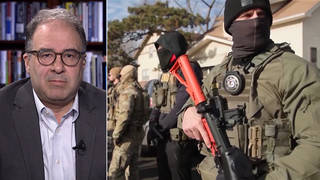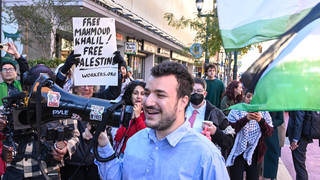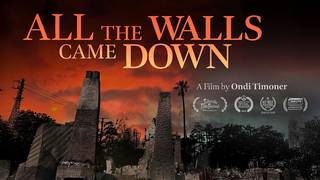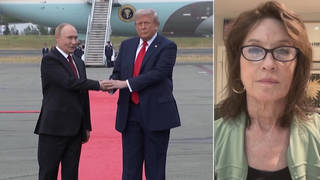
White House officials have confirmed that President Trump and Russian President Vladimir Putin could meet as early as next week to discuss the war in Ukraine. It would be the first U.S.-Russia summit in more than four years. Trump reportedly plans to follow up that meeting with another three-way meeting between himself, Putin and Ukrainian President Volodymyr Zelensky. We speak with The New York Times opinion columnist M. Gessen, who says Putin is “fully invested in continuing this war forever.” The war on Ukraine “is not the kind of thing that you can roll back in a totalitarian state,” says Gessen. “It destabilizes the politics, it destabilizes the psychology of the country, and at this point it destabilizes the economy of the country to try to retrofit it back to a civilian economy.”
Transcript
NERMEEN SHAIKH: White House officials have confirmed that President Trump and Russian President Vladimir Putin could meet as early as next week to discuss the war in Ukraine. It would be the first U.S.-Russia summit in more than four years. It’s unclear where the talks would take place, since there’s an ICC arrest warrant out for Putin. The U.S. has floated the possibility of a follow-up three-way summit including Ukrainian President Volodymyr Zelensky, but Russia has not commented on this. On Wednesday, U.S. special envoy Steve Witkoff met with Putin in Moscow.
AMY GOODMAN: For more, we begin today’s show with Russian American journalist M. Gessen, opinion columnist for The New York Times, author of 11 books, including Surviving Autocracy and The Future Is History: How Totalitarianism Reclaimed Russia, which won the National Book Award in 2017.
M. Gessen, welcome back to Democracy Now! Let’s begin with this news that broke overnight that Putin and Trump will meet for the first summit in four years. And then there’s speculation there would be a three-way summit with Zelensky, though Putin has not confirmed this. Your response to this latest news and what this meeting could mean?
M. GESSEN: Well, this meeting is a feather in Putin’s cap. I think that’s the long and the short of it. Putin continues these so-called negotiations with no interest in reaching any kind of peace agreement. But the legitimacy, the sort of the renewed legitimacy that a conversation with the United States, and personally with the U.S. president, means for Putin is huge.
NERMEEN SHAIKH: And what, precisely, M. Gessen, is it? I mean, now what are Russia’s objectives, long-term objectives, in this war?
M. GESSEN: Well, let’s separate the objectives that Russia states it has and the objectives that I think Putin has. Russia’s stated objectives are to have forever guarantees that Ukraine will not join NATO and to annex more Ukrainian land than Russia has actually been able to occupy in the last three-and-a-half years of war, and Russia already occupies about 20% of Ukrainian territory. So, you know, these demands are absurd, obviously illegal, and demands that Ukraine couldn’t possibly agree to even in the presence of what I think, on Ukraine’s part, is a good-faith desire to reach a peace agreement. Now, what Russia actually wants is, I think, a little bit different from these articulated demands. And what Russia wants at this point just to continue this war in perpetuity.
NERMEEN SHAIKH: And, M. Gessen, could you explain why that is? What are the domestic considerations for Putin in continuing this war?
M. GESSEN: Well, at this point, Russia has become a country at war, and Putin’s regime has become a regime at war. This is not the kind of thing that you can roll back in a totalitarian state. It destabilizes the politics, it destabilizes the psychology of the country, and at this point it would destabilize the economy of the country to try to retrofit it back to a civilian economy.
NERMEEN SHAIKH: What would it mean? How would it destabilize the economy? And in fact, if you could give us a sense of how the Russian economy has been impacted by now years of sanctions, and what the possible effects would be once Trump’s secondary sanctions go into place, in particular against India, which is the second-largest importer of Russian oil?
M. GESSEN: Well, the fact that India is the second-largest importer of Russian oil, and there’s a bigger importer of Russian oil, and the fact that Russian oil continues to go to Europe despite three years of sanctions, it gives us a suggestion of just how small the impact of sanctions has been. What there has been is a kind of Western spontaneous economic boycott of Russia, but not any kind of structural sanctions that could really affect the Russian economy. What that has created is a kind of catch-up game, which sanctions on India aren’t going to significantly change.
Russia has been able to retool its economy, to reorient it toward manufacturing for war, selling for war, trading with the non-Western world for war, in a way that you can’t put a dent in by imposing even huge sanctions, even on the second-largest importer of Russian oil, even if it has the imagined effect of India stopping to import Russian oil. Most likely, that will not happen. Most likely, as with other countries, there will be third-country schemes that Russia has become expert at creating, and the West has, frankly, become expert at ignoring.
AMY GOODMAN: We’re going to talk more about the imposition of increased tariffs, up to 50% on India, by going to New Delhi in a moment. But I want to ask you how you see Russia’s war on Ukraine ending. You have this ominous development where President Trump says he is moving nuclear submarines to intimidate the nuclear-armed Russia, this especially significant this week, the 80th anniversary of the only dropping of atomic bombs, and that was the U.S. bombing Hiroshima and Nagasaki in Japan. And do you think that Putin could survive the end of his war on Ukraine?
M. GESSEN: Those are great questions. So, I don’t think that Putin can survive the end of the war in Ukraine, or, more to the point, I don’t think Putin thinks that he can survive an end of the war to Ukraine — an end to the war in Ukraine. And that basically tells us everything we need to know. He is fully invested in continuing this war forever. There’s absolutely no reason — political, psychological, economic — that would force him to end the war, except for the possibility of being brought to his knees on the battlefield.
Moving nuclear submarines, playing a game of nuclear chicken, is not going to do it. Putin is convinced that — you know, Russia has been — Russian propaganda, both targeted domestically and internationally, has revolved around the possibility of a Russian first nuclear strike for years now. This idea that we are going to go to heaven if we blow up the entire world, or, more to the point, some of us will survive, and we don’t care if the rest of the world goes to nuclear hell, this idea is actually entrenched in Russia. And so, sort of unconvincingly swinging the nuclear threat on the part of the United States is not going to put a dent in it.
What would possibly convince Putin is if he saw his regime ending as a result of the war in Ukraine. And the only way that that could happen is if he started losing. At this point, there is a semi-frozen frontline. Russia is very, very slowly making advances. Sometimes it has to retreat slightly. But, basically, the frontline has been in more or less the same place since the fall of 2022. And Russia has millions of people to sacrifice. Russia does not care at this point how much depopulation it causes. And Ukraine, as still, basically, a democratic country, doesn’t have the same kinds of human resources and the same kinds of political resources to expand on this war. And that gives the aggressor a permanent advantage.
NERMEEN SHAIKH: And what about domestically, M. Gessen? How is this war now perceived in Russia? I mean, to the extent that one can gauge public opinion, what is it? And is there any remaining independent media operating in Russia now?
M. GESSEN: There hasn’t been independent media in Russia since the week after the full-scale invasion, so since basically March 2022. There has been independent media in Russian. There’s independent media in exile that, like a lot of — a lot of important projects in the world, is suffering, actually, hugely from losing some support that it had from the State Department. But at this point, there are still some brave and very ingenious Russian reporters telling people inside Russia about the war in Ukraine. But their audience, comparatively, is very, very small.
And no, we can’t judge public public in a totalitarian country, and we can’t judge public opinion in a country at war. What we do know is that Ukrainians have succeeded in making Russians, who live far away from the front, feel that it is a country at war. That is probably the biggest single military gain that Ukraine has made in the last six months or so. Right? There’s constant — there are frequent drone strikes deep inside Russian territory, and there’s this constant sense, from what we can tell, that Russians everywhere, not just living near the border with Ukraine, that Russians everywhere are vulnerable and that civilian life can be disrupted, transportation can be disrupted, airports are constantly getting shut down because of drone attacks, that sort of thing. That’s a major negotiating advantage that Ukraine has — I mean, not an advantage over Russia, but an advantage over its previous position, that Ukraine has gained in recent months.
It has been floated that possibly a ceasefire agreement that would satisfy Trump could involve both countries agreeing to stop strikes inside — deep inside enemy territory. That proposal is on the table. That does not seem to be the proposal that Americans have advanced, and it does not seem to be a proposal that Russia has advanced. But there’s talk that this is something that, at least on a temporary basis, could happen. That would be a great relief to many Ukrainians, because Russia has intensified its attacks on Kyiv, on Odesa, sometimes on other cities far away from the frontline. At the same time, it would not mean the end to the war. It would not mean that Ukraine could lift its state of emergency, that Ukrainian women and children could return to the country, that Ukrainian men, who are forbidden from leaving the country, that they could reunite with their families. It would not change the life of Ukraine, which has been in an emergency life situation for three-and-a-half years now. And Russia has not.
NERMEEN SHAIKH: M. Gessen, very quickly, before we conclude, you’ve drawn comparisons between Putin’s Russia and now Trump’s America. If you could just say: What are your concerns, and what do you think resistance should look like?
M. GESSEN: I can’t give prescriptions for resistance. What I do know, actually, is that where autocratic attempts have been reversed — and I’m not sure even we’re at the stage of an autocratic attempt; I think we’re beyond it. I think we are now living in an autocracy. And this is what autocracy in its early stages feels like, right? It feels like some people are being affected by — some people have the full experience of living in a police state, but most of us don’t. Some people have had their professional lives completely disrupted and have had their freedom of speech hugely impacted, but most people have not, and that, you know, just the number of people who live in a police state and the number of people whose daily lives are disrupted is just going to continue growing and growing and growing.
Where autocratic attempts have been reversed, it has been by bringing together a coalition of people who don’t have a political agenda in common, but who are equally outraged by having their freedoms taken away. This is what we saw happen in Ukraine, actually, during its revolution of 2003-2004 and then again during — I’m sorry, 2004-2005 and again during its revolution of 2013-2014: a broad coalition of conservatives and liberals in Ukraine, Western-oriented people and nationalists, coming together and saying, “You can’t take this away from us. We have sacrificed too much to live in a democratic country.” I don’t know if this can happen in the United States, but that’s probably our best hope.
AMY GOODMAN: M. Gessen, we want to thank you so much for being with us, opinion columnist for The New York Times, author of 11 books, including Surviving Autocracy and The Future Is History: How Totalitarianism Reclaimed Russia, winner of the National Book Award.












Media Options